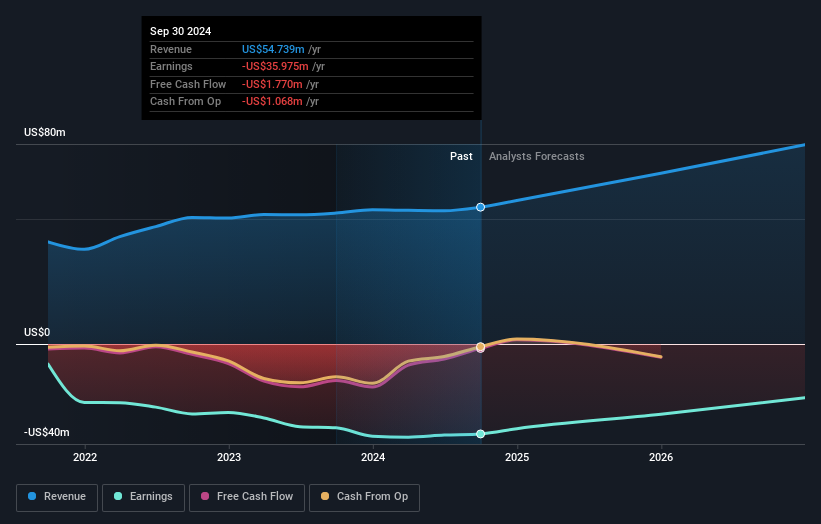- United States
- /
- Software
- /
- NasdaqGM:AIP
With 39% ownership in Arteris, Inc. (NASDAQ:AIP), institutional investors have a lot riding on the business

Key Insights
- Given the large stake in the stock by institutions, Arteris' stock price might be vulnerable to their trading decisions
- 52% of the business is held by the top 7 shareholders
- Recent sales by insiders
If you want to know who really controls Arteris, Inc. (NASDAQ:AIP), then you'll have to look at the makeup of its share registry. We can see that institutions own the lion's share in the company with 39% ownership. In other words, the group stands to gain the most (or lose the most) from their investment into the company.
And last week, institutional investors ended up benefitting the most after the company hit US$281m in market cap. The gains from last week would have further boosted the one-year return to shareholders which currently stand at 76%.
In the chart below, we zoom in on the different ownership groups of Arteris.
Check out our latest analysis for Arteris

What Does The Institutional Ownership Tell Us About Arteris?
Many institutions measure their performance against an index that approximates the local market. So they usually pay more attention to companies that are included in major indices.
We can see that Arteris does have institutional investors; and they hold a good portion of the company's stock. This suggests some credibility amongst professional investors. But we can't rely on that fact alone since institutions make bad investments sometimes, just like everyone does. If multiple institutions change their view on a stock at the same time, you could see the share price drop fast. It's therefore worth looking at Arteris' earnings history below. Of course, the future is what really matters.

We note that hedge funds don't have a meaningful investment in Arteris. The company's CEO Karel Janac is the largest shareholder with 27% of shares outstanding. With 6.1% and 5.2% of the shares outstanding respectively, Needham Investment Management, LLC and Ventech SA are the second and third largest shareholders.
We did some more digging and found that 7 of the top shareholders account for roughly 52% of the register, implying that along with larger shareholders, there are a few smaller shareholders, thereby balancing out each others interests somewhat.
Researching institutional ownership is a good way to gauge and filter a stock's expected performance. The same can be achieved by studying analyst sentiments. Quite a few analysts cover the stock, so you could look into forecast growth quite easily.
Insider Ownership Of Arteris
The definition of an insider can differ slightly between different countries, but members of the board of directors always count. Company management run the business, but the CEO will answer to the board, even if he or she is a member of it.
I generally consider insider ownership to be a good thing. However, on some occasions it makes it more difficult for other shareholders to hold the board accountable for decisions.
It seems insiders own a significant proportion of Arteris, Inc.. It has a market capitalization of just US$281m, and insiders have US$89m worth of shares in their own names. This may suggest that the founders still own a lot of shares. You can click here to see if they have been buying or selling.
General Public Ownership
The general public, who are usually individual investors, hold a 24% stake in Arteris. This size of ownership, while considerable, may not be enough to change company policy if the decision is not in sync with other large shareholders.
Private Equity Ownership
With a stake of 5.2%, private equity firms could influence the Arteris board. Some investors might be encouraged by this, since private equity are sometimes able to encourage strategies that help the market see the value in the company. Alternatively, those holders might be exiting the investment after taking it public.
Next Steps:
It's always worth thinking about the different groups who own shares in a company. But to understand Arteris better, we need to consider many other factors. Take risks for example - Arteris has 3 warning signs we think you should be aware of.
Ultimately the future is most important. You can access this free report on analyst forecasts for the company.
NB: Figures in this article are calculated using data from the last twelve months, which refer to the 12-month period ending on the last date of the month the financial statement is dated. This may not be consistent with full year annual report figures.
New: Manage All Your Stock Portfolios in One Place
We've created the ultimate portfolio companion for stock investors, and it's free.
• Connect an unlimited number of Portfolios and see your total in one currency
• Be alerted to new Warning Signs or Risks via email or mobile
• Track the Fair Value of your stocks
Have feedback on this article? Concerned about the content? Get in touch with us directly. Alternatively, email editorial-team (at) simplywallst.com.
This article by Simply Wall St is general in nature. We provide commentary based on historical data and analyst forecasts only using an unbiased methodology and our articles are not intended to be financial advice. It does not constitute a recommendation to buy or sell any stock, and does not take account of your objectives, or your financial situation. We aim to bring you long-term focused analysis driven by fundamental data. Note that our analysis may not factor in the latest price-sensitive company announcements or qualitative material. Simply Wall St has no position in any stocks mentioned.
About NasdaqGM:AIP
Arteris
Provides semiconductor interconnect intellectual property (IP) and System-on-Chip (Soc) Integration Automation software solutions (SIA) in the Americas, the Asia Pacific, Europe, and the Middle East.
Excellent balance sheet low.


